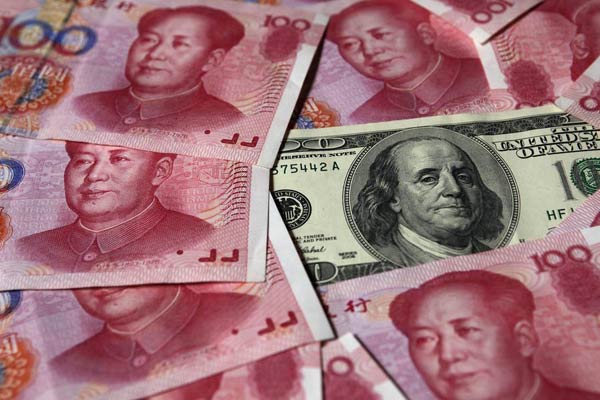 |
|
A $100 banknote is placed next to 100 yuan banknotes in this October 16, 2010 file picture illustration taken in Beijing. [Photo/Agencies] |
Some even predict that the Chinese currency will fall gradually to about 6.5 to the US dollar by the end of this month, and perhaps drop to 6.7 next year.
The yuan fell to a four-year low of 6.4495 against the dollar on Monday, according to the China Foreign Exchange Trading System.
Since it was announced at the end of last month that the yuan would join the International Monetary Fund's Special Drawing Rights basket as one of five global reserve currencies, the yuan-dollar exchange rate has fallen by 0.83 percent.
The US Fed is scheduled to meet on Tuesday and Wednesday, when chairwoman Janet Yellen is expected to announce the interest rate increase, adding depreciation pressure to other currencies, especially those of emerging economies.
Ng Yew-Kwang, an economics professor at Nanyang Technological University in Singapore, said on Monday that the yuan's depreciation shows that many prices have been rising more rapidly in China than in the US.
"There is no longer a basis for a major rise in the yuan's value, nor a major fall," Ng said at the Netease Annual Economist Conference in Beijing.
Lin Caiyi, chief economist at Guotai Junan Securities, said that with falling exports and rising labor costs, realistic support for the yuan's appreciation has become "rather weak".
However, the People's Bank of China, the central bank, said in a statement that in the medium-to long-term, the yuan's exchange rate will remain stable at a reasonable level.
This is based on China's economic growth rate, which is the highest in the world, as well as on an increased desire to hold yuan-denominated assets after the currency's inclusion in the IMF's basket.
Paul Mackel, head of global emerging markets foreign exchange research at HSBC Holdings, said that to date the central bank's method of managing the yuan has been consistent with its eventual goal of achieving a "clean float" regime, or a market-denominated system.
